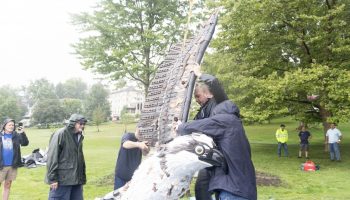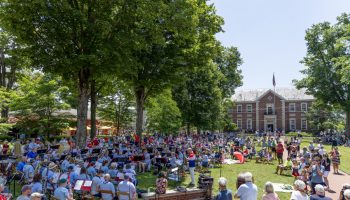Fourteen weeks after Mikhail Gorbachev was elected as the General Secretary of the Communist Party of the Soviet Union, and thus its de facto head of government, Chautauqua Institution opened its 1985 season with a week-long program of political and artistic exchange: The Chautauqua Conference on U.S.-Soviet Relations.
“The importance of this week was (in part that) it occurred just after the ascension to power of Secretary Gorbachev and before his proclamation of increased openness in relations which finally culminated in the Reagan-Gorbachev Geneva Exchange Initiatives,” Daniel L. Bratton, the Institution’s president at the time, wrote in his published account, The Journey to Jūrmala.
Bratton continued: “During the week’s program Andrei Parastaev of the Soviet Embassy raised the possibility of a reciprocal trip by Chautauquans to the Soviet Union in 1986.”
In celebration of the 30th anniversary of the first cultural accord with the USSR, signed by President Dwight D. Eisenhower, his daughter Susan, executive director of the Eisenhower World Affairs Institute at Gettysburg College, partnered with Chautauqua in organizing a five-day Chautauqua-like meeting in the USSR in September 1986.
At 9:15 a.m. Thursday at the Chautauqua Women’s Club, Jane and Tom Becker, and Jane Lahey, will discuss this unforgettable trip and conference — their “Journey to Jūrmala” — that they participated in nearly 30 years ago.
A city along the Baltic Sea, the Jūrmala that the Beckers and Lahey visited was within what, at that time, was Soviet-controlled Latvia. The city was chosen as the site for the Chautauqua Institution/Eisenhower Institute Conference on U.S.-Soviet Relations: A Journey to Open Diplomacy.
When American journalist Nicholas Daniloff was arrested by KGB agents in Moscow on Aug. 30, 1986, and detained in jail as a spy, it was nearly derailed.
“At that time, President Reagan and his conservative spokespeople were calling the USSR the ‘Evil Empire,’ ” Jane Becker said. “… There’s an enormous story between (Aug. 30) and Sept. 11, when we did leave (for the conference). Behind the scenes, there was big ‘P’ politics (between the United States and Moscow), and small ‘p’ Chautauqua politics (about) how to respond to it.”
Thus began the second of five annual U.S.-USSR conferences for delegations of Chautauquans, American performing artists, diplomats and scholars, and representatives of the USSR and the Soviet Embassy in Washington from 1985 to 1989.
Bratton wrote that a “key and early staff player in the game was Tom Becker, vice president for development at Chautauqua. He recognized early in the game the great possibilities of the trip for the Institution, including the development dimension. He, therefore, immediately became a strong advocate for the trip within the councils of the Institution and my primary aide in handling what would be a nightmare of administrative decisions and details to be addressed.”
At that time, Tom Becker was also vice president of the Chautauqua Foundation. He later became executive vice president for development and CEO of the Foundation, followed by president of the Institution, a position he held for 13 years.
Currently, he sits on the boards of the Ralph C. Sheldon Foundation in Jamestown, New York; the Lincoln Institute of Land Policy in Cambridge, Massachusetts; the International Spy Museum in Washington; and Claremont Lincoln University in Southern California.
Executive coach Jane Becker is co-founder of the Coalition of Chautauqua County Women and Girls. She also serves on the Chautauqua County Racial Equity Steering Committee, and helps the Nonprofit Capacity Building Program for Chautauqua County with leadership development.
Longtime Chautauquan Jane Lahey, who grew up spending her summers living at the Athenaeum Hotel with one of her grandmothers, and worked as a counselor at Girls’ Club for five seasons, is a family historian who spent much of her life in Springfield, Illinois, and now winters in Florida.
She and her late husband participated in the conference at Jūrmala as Chautauquans and American citizens.
“It was after we’d been there that we thought, the Soviet Union isn’t as bad as we feared because it was kind of sad economically,” Lahey said. “(On the return trip) I went to London, (where) in a shop I got some Russian souvenirs, just a few, because I couldn’t get them in Moscow.”
If there’s time on Thursday morning, Lahey and the Becker’s will connect their 1986 experience to current events in Eastern Europe.




